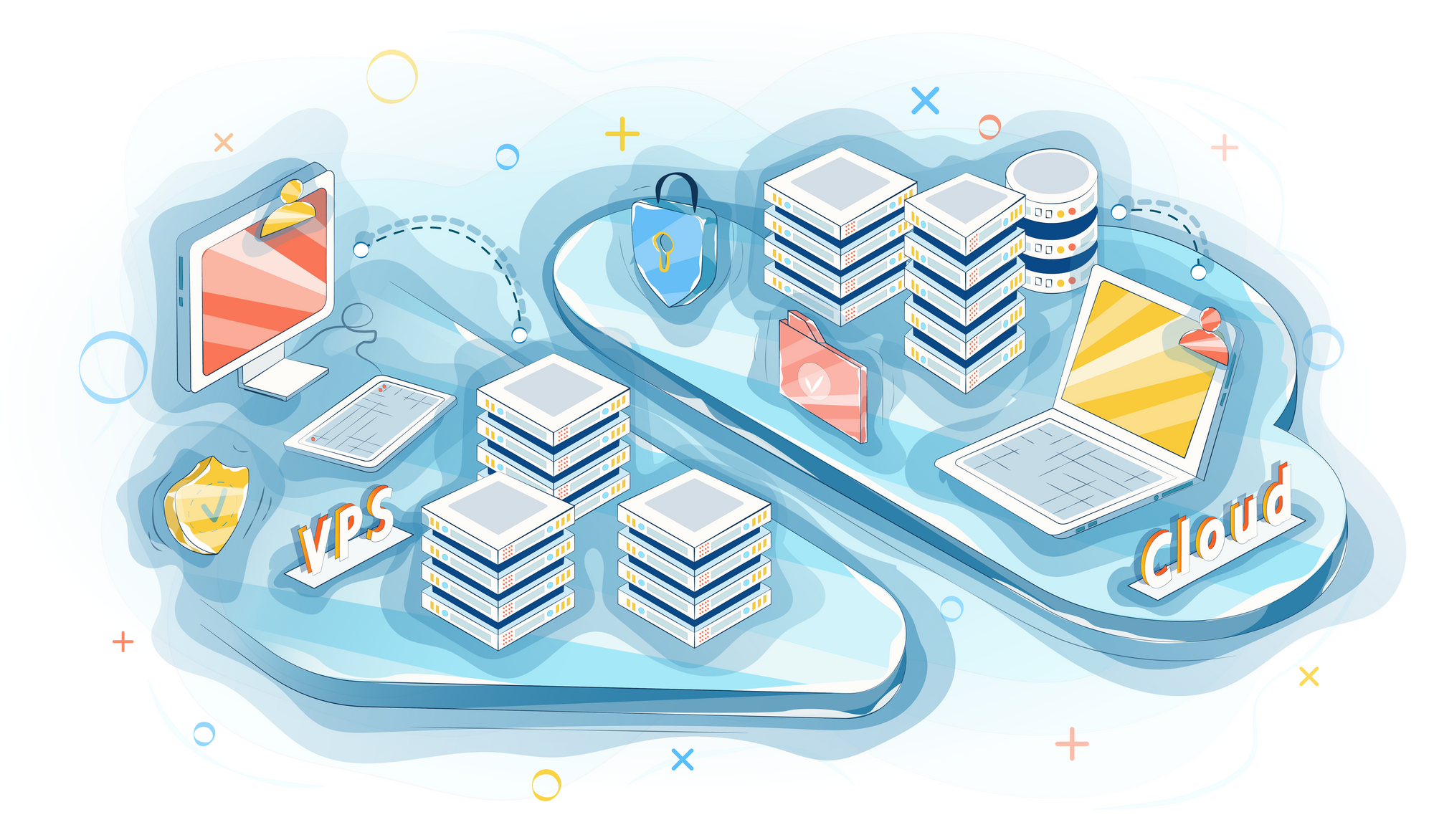Many users, especially those far enough from IT technologies, believe that a server and a cloud are the same. In fact, these two concepts differ significantly. So, a virtual server and a cloud are not analogs. Today we will figure out what a server and a cloud are and what is the difference between these concepts.
What is a server?
The server is used to perform certain computing processes. Other devices that make a request and receive a response from the server are called clients. In simple words, a server is a computer that provides services to users of other computers.
But familiar to most users PCs are not used for server hardware. Servers differ from ordinary computers in components that provide continuous operation and enable complex 24/7 computing processes. They are configured to perform important and complex tasks since the processed data should not contain any errors.
The hardware part of the server consists of chassis, CPU, motherboard, RAM, hard drive, network cards, and other parts. All parts of the server equipment are designed to ensure the speed and reliability of the processes performed. This is especially important for mission-critical applications, as it helps to prevent errors.
Imagine that the server is used by an organization that works in the field of finance or medicine. Such enterprises store important information about customers and use specific software. If the server fails or data loss occurs, this can be disastrous for the company.
Conditionally, servers are divided into different types depending on their functionality and purpose. Those include the following:
- file servers (they are used to store and distribute files);
- mail servers (such servers receive and store e-mail, and then provide it to a client);
- application servers (they launch applications instead of local client devices);
- DNS servers are domain name systems that convert domain names into IP addresses;
- web servers (responsible for hosting programs and data requested by users over the network. Besides, they respond to requests from client browsers).
Servers can be used to perform one task. A mail server is a vivid example of it. In other cases, they can perform several tasks. Servers that can perform several tasks include a file and print server, which stores files and receives print jobs from clients. Then, it sends them to a printer connected to the network.
What is the cloud?
Unlike the server, the cloud is a pool of resources. It includes many components, like data warehouses, processor power, memory arrays, and other hardware units dynamically allocated to the user on demand. The hardware is maintained by the supplier, so clients have no problems with managing physical and virtual devices.
There are 3 types of cloud systems:
- Public cloud systems. Cloud resources are distributed among all users. So, you can access the account through a browser or a publicly available client program on your personal device. For example, Microsoft Azure, Dropbox, and iCloud are public clouds.
- Private cloud systems. Computing resources are used by one company only. This simplifies customization, so it's easy to meet your organization's IT needs. The private cloud can be physically located in the data center of the enterprise that uses it. It can also be located with a third-party service provider.
- Hybrid cloud systems. Such systems combine the advantages of the systems we have already described, providing the ability to migrate between them and use both types. For example, a company can use a public cloud for a large array of data that does not require increased privacy and a private cloud for critically important operations.
Users receive resources to perform complex operations on demand. The cloud offers scalability according to demand. This means that customers pay only for those services that they use. Therefore, in some cases, clouds help to save money, as you don't need to buy expensive server equipment and spend money on its maintenance.
The main difference between the virtual server and the cloud
The difference between an ordinary physical server and a cloud is understandable even with minimal familiarity with both concepts. Confusion arises if you go a little bit deeper.
Most often, clouds and virtual VPS/VDS servers are considered to be the same. For users with little understanding of different processes, both concepts may really seem the same. Both VPS/VDS servers and clouds are designed to host files, websites, as well as accounting and management systems. So, let's figure out the main difference between these two concepts.
VPS/VDS is an emulation of the hardware and software server complex. Most often, there can be several isolated virtual servers on one physical server. Each individual user has a limited number of resources within their VPS/VDS. A certain number of cores and memory are allocated to each virtual server. The resource limit for the selected VPS/VDS rental rate cannot be exceeded. If necessary, you can change the configuration. For example, King Server offers those customers who rent a virtual server the ability to scale easily in order to increase or decrease resources.
Speaking about the cloud, it does not limit performance. Cloud systems, as it was previously mentioned, are pools of resources. If the server resources are exhausted, for example, if there is not enough RAM or disk memory, the load goes to another one that is not so overloaded. When a client leases a cloud, this person actually gets a scalable cluster of servers. The client pays only for the resources consumed (initially established tariff is ignored). As for VPS/VDS, all payments are made at the originally established rate.
Thus, virtual server performance depends on the initial configuration. Speaking about clouds, resources are not limited.
What is better to choose?
Understandably, the choice depends on the customer's needs. Here are several cases with different relevant options.
Cloud is the best option for cases where the load is unstable. For example, your project is an event company. The maximum number of resources is required during the duration of the activities. At other times, high performance is not required. Using the cloud, you pay for the resources that were actually used. So, your site quickly adapts to the increased load.
A virtual server is required for those projects that require full resource isolation and high performance. If there is too much traffic on your website and regular hosting cannot ensure stable operation, you should think about switching to VPS/VDS.
There is also another variant - dedicated server rental. We have already written about when it may be relevant, so you can get acquainted with this information here. In a nutshell, it's relevant when you have a large web project or increased privacy requirements. If you use a dedicated server, you have an opportunity to monitor the software, its installation, and testing. This is especially important for organizations that need to monitor the frequency of the updates, as any downtime can affect the project as a whole. It is profitable to rent the cloud if there are some periodic load surges. As for the dedicated server, it allows you to cope with projects for which high performance is constantly needed easily. In addition, VDS and dedicated servers are distinguished from cloud capacities by the level of access offered to the client. As a rule, the user cannot change the cloud software configuration. Using VPS and dedicated servers, the client receives full administrative access.
Server rental from King Server
For those customers who want to ensure the stable, uninterrupted, and secure operation of their resource, King Server offers services for leasing both virtual and dedicated servers. We provide the best conditions for our customers:
- 2 levels of technical support;
- 24-hour access to resources;
- possibility to choose a location - USA, Netherlands, or Russia;
- 100% guaranteed network uptime.
King Server offers a wide range of rates for customers with different needs. In addition, you can order DDoS attacks protection, which will protect your resource from external interference. So, contact us in any convenient way!

























